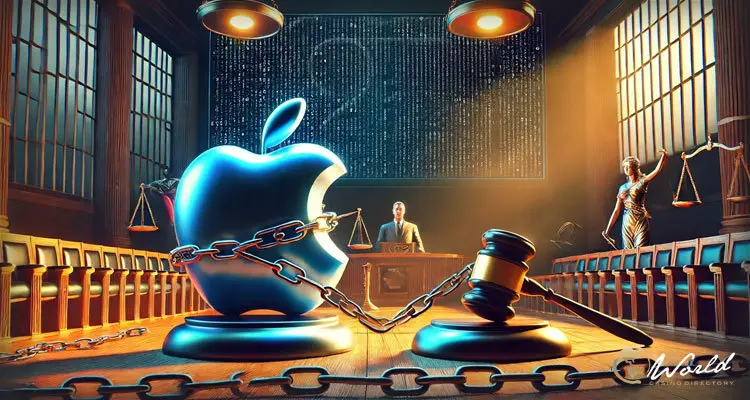Two of the tech industry’s behemoths, Apple and Google, find themselves embroiled in a significant legal challenge as they are accused of promoting and profiting from illegal gambling operations through their digital storefronts. This contentious issue surfaced with the filing of a new lawsuit in the District Court of New Jersey, claiming that these corporations have not only facilitated but also financially benefited from sweepstakes casino games available on their platforms.
Accusations in the Garden State:
The lawsuit, detailed in documents submitted on November 28, targets Apple and Google alongside their payment systems, alleging a collaborative role in supporting illegal gambling through four specific sweepstakes casino operators: High 5 Casino, Wow Vegas, Crowncoins Casino, and McLuck.com. This legal action mirrors the structure of several class actions currently progressing through the judicial system, which seek to recoup expenditures incurred by consumers on these platforms.
The legal documents assert, “This case addresses the patently illegal gambling software that is being distributed across New Jersey and beyond to personal electronic devices through an unlawful enterprise involving two of the world’s most successful corporations.” It elaborates on the standard operation of these casinos, where users are enticed with “Game Coins” for play, complemented by “Sweeps Coins,” which are ostensibly redeemable for cash and prizes. However, the filing criticizes the payout practices of these platforms as infrequently executed and predominantly withheld based on “arbitrary and largely contrived reasons.”
Julian Bargo, the lead plaintiff, claims substantial financial losses exceeding $1,000, attributing his misfortune to the manipulative practices of these sweepstakes casinos. In a departure from previous lawsuits, the legal team has invoked the federal RICO Act, accusing the defendants of acting as part of an ongoing criminal organization.
Implications and industry impact:
Despite their vast reach and influence, past legal challenges have notably excluded Apple and Google as defendants, focusing instead on other aspects of these operations. Through the App Store and Play Store, the complaint continues, these companies have managed significant financial transactions related to these dubious activities, taking a considerable portion of the proceeds.
The case also highlights a broader legislative effort to clamp down on sweepstakes casinos through the “Model Internet Gaming Act,” drafted by the National Council of Legislators from Gaming States. This proposed legislation aims to establish a legal framework for states to manage and possibly outlaw these types of gambling operations, with substantial penalties laid out for violations.
In a parallel narrative, the industry’s lucrative nature is underscored by the success of Australia-based Virtual Gaming Worlds, operator of prominent platforms like Chumba Casino, LuckyLand Slots, and Global Poker. As reported by iGaming Business, in 2023 alone, it boasted $4 billion in revenue, with net earnings reported at $322 million, funding high-profile sponsorships and celebrity endorsements, showcasing the significant economic stakes involved.



